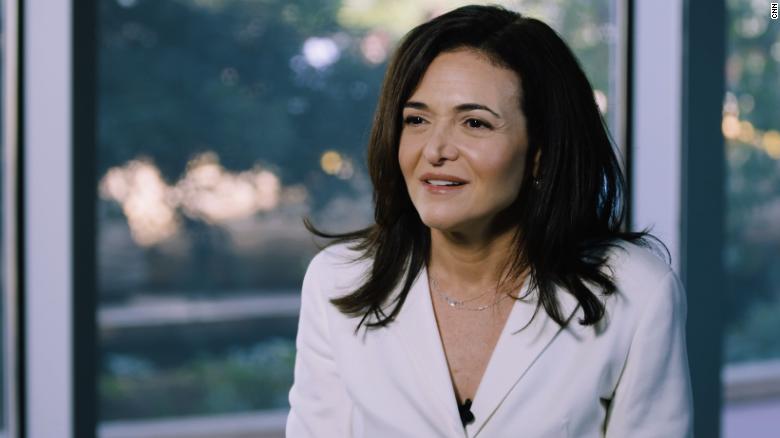What really triggered the exit of Facebook's feminist queen?
TOM LEONARD examines how the billionaire public face of the social media giant Sheryl Sandberg quit under clouds of controversy
- Sheryl Sandberg was the social media icon who told women they could have it all
- But as Nick Clegg takes her place, questions about her exit still remain
- Ms Sandberg had just a day of good press before news broke of a probe
When Sheryl Sandberg was at the height of her power as Mark Zuckerberg's number two at Facebook, she reportedly hired a PR company who charged $30,000 a month to burnish her public image.
But, following her departure from the social media giant last week after 14 years, insisting she needed to spend more time with her family and work on various philanthropic enterprises, she is in need of their services more than ever.
For Miss Sandberg — whose role as the public face of the social media giant has now been filled by the company's president of global affairs, the former Lib Dem leader Nick Clegg — had just a day to bask in progressive virtuousness before it emerged there might be other reasons why she'd left the controversial technology company.

Miss Sandberg (pictured last July with Mark Zuckerberg) became Facebook's valuable face
It turns out that Silicon Valley's feminist queen, who claimed she was leaving principally to help her fellow women fight attempts by a conservative-dominated U.S. Supreme Court to challenge legal abortion in America, was reportedly under investigation by her ex-employer over her use of company resources.
Within 24 hours of Miss Sandberg's rather pious announcement, the Wall Street Journal sensationally reported that she has been the subject of a probe by Facebook lawyers for months over her use of company staff and resources on her personal projects.
And we're not talking about PAs dashing out to collect her dry cleaning or pick up an oat milk latte, but people said to be working on her philanthropic foundation, promoting her next book, and allegedly organising her forthcoming wedding to Tom Bernthal, the chief executive of a marketing consultancy.
Both Facebook and Sandberg have denied that the internal investigation into her behaviour has anything to do with her decision to leave Facebook — she will be staying on as a member of the board of its parent company Meta Platforms — and the Journal conceded that senior Facebook executives often use company resources to get things done in areas of their private lives.
However, the allegations threaten to damage the legacy of a billionaire businesswoman who had such a central role in turning Facebook into a social media phenomenon, albeit one with a reputation for not doing enough to root out hate speech and 'fake news'.
Since the former management consultant and Google advertising expert joined the company in 2008 — four years after its founding — to be 'the adult in the room' and help it monetise its vast and growing base of users, its annual revenue has ballooned from $200 million to $117 billion last year.

Sandberg is accused of using company resources to plan her upcoming wedding to marketing executive Tom Bernthal (also pictured). She denies it had anything to do with her exit
And her rewards have been correspondingly vast. In 2020, Miss Sandberg took home just over $875,000 in basic pay, and a bonus of more than $900,000, as well as $19.7 million in shares. Her total net worth is put at $1.6 billion.
The Journal reported that her departure was the 'culmination of a years-long process in which one of the world's most powerful executives became increasingly burned out and disconnected' from Facebook.

Ms Sandberg (pictured at an abortions protest in Washington, DC) claimed to be leaving the company to focus on activism
But the way Sandberg pitches it, she was giving it all up for the sake of womankind.
'This is a really important moment for women,' she gushed about the Supreme Court's challenge to the historic Roe v Wade ruling that paved the way for legal abortion in the US. 'This is a really important moment for me to be able to do more with my philanthropy, with my foundation.'
She also said that after struggling to juggle work and home life, she wanted to spend more time with her family.
Miss Sandberg, whose first marriage ended in divorce after a year, had two children with her second husband, Dave Goldberg, who died in 2015 after an accident at a holiday villa in Mexico.
Then, in 2019, her former brother-in-law Rob set her up with Tom Bernthal. The couple became engaged in February 2020, Bernthal proposing with a ring decorated with five tiny hidden diamonds, representing their five children (Bernthal has three with his ex-wife).
In an intimate letter to Bernthal last year, published in Good Housekeeping, Sandberg said she 'could barely imagine dating again, much less getting married' after losing Goldberg. But she changed her mind upon meeting Bernthal.
The wedding is likely to include famous friends such as businesswoman Arianna Huffington, broadcaster Katie Couric and actress Kate Bosworth

Sandberg (pictured in Paris, 2017) will remain on the board of parent company Meta Platforms
But Sandberg's domestic bliss may well be marred by claims that were reported earlier this year.
The Wall Street Journal reported that there had been 'fresh irritation' at the top of Facebook over the newspaper's allegations that Sandberg had 'pressured' the Daily Mail's online operation to scrap an article about a temporary restraining order taken out against Miss Sandberg's then boyfriend, computer games tycoon Bobby Kotick, chief executive of Activision Blizzard, by an old flame.
The woman later retracted some of the allegations and Meta denied that any threat against the website had ever been made.
Today, Meta has a market capitalisation of $455billion but its success has come at a price —and one that's been paid by its account holders.
With nearly three billion active users, many of us have clearly not been put off by the endless wave of negative headlines Facebook has attracted over the years, but the company has earned a reputation as uniquely duplicitous and venal even by Silicon Valley standards.

Sanberg (pictured in 2018) has been credited as a key to Facebook's decades-long success
Under Zuckerberg and Sandberg, the company lurched from scandal to scandal. Most notably, it was accused of running ads paid for by 'Russian actors' with links to the Kremlin during the 2016 U.S. presidential election.
And it was sued for $150billion by displaced members of Myanmar's Rohingya community over claims it contributed to genocide in their homeland by not only failing to take down inflammatory posts about the country's Muslim minority but amplifying them via its algorithms.
However, the incident that may have proved a turning point for Sandberg's fortunes concerned the British consulting firm Cambridge Analytica.
Facebook allowed it to harvest 87 million users' private information without their consent and use this data to target voters in the 2016 U.S. presidential election.
Mr Zuckerberg reportedly laid the blame for this fiasco — which saw Facebook fined £500,000 in the UK for a 'serious breach' of the law — squarely on the shoulders of Miss Sandberg, who apologised repeatedly for Facebook's mistakes over the Cambridge Analytica scandal and took personal responsibility. She told the Financial Times in April 2018: 'We made mistakes and I own them and they are on me.'
Insiders say her star started to fade at the company from that point.

Her legacy could be risked by an internal probe into alleged misuse of resources (Meta HQ)
But perhaps the most damaging blow to the company — and by extension Miss Sandberg — was struck last year by one of its own: Facebook whistleblower Frances Haugen provided a shocking insight into the inner workings of the intensely secretive tech giant. She told Congress that the social media giant knew it was harming children, sowing division and undermining democracy, but continued to do so in pursuit of frenetic growth and 'astronomical profits'.
Haugen revealed an internal company study that found that 13.5 per cent of UK teenage girls said their suicidal thoughts became more frequent after joining the social media site Instagram, owned by Facebook.
Another leaked study found 17 per cent of female teenagers said their eating disorders got worse after using Instagram.
(Facebook countered that it had taken steps to rectify the failings identified by Ms Haugen.)
Who, one might well ask, walks away from all this carnage, lightly saying that they need to devote their valuable time and money to fighting for women's rights? It would have to be someone with a lot of chutzpah. And Miss Sandberg, a former high-flying U.S. Treasury official who was top of her class at Harvard Business School, certainly has that.
In 2013, she published her first book, Lean In: Women, Work And The Will To Lead, in which she argued that — contrary to received opinion that working mothers had to make compromises — they could have it all, if only they were a bit more like her. Put your career first, 'lean in' to your job, and the rest of your life will sort itself out.

Sandberg, pictured during a 2018 Senate hearing, was a leading light in corporate America
While she described it as a 'sort of feminist manifesto', many women lambasted Miss Sandberg as patronising and elitist.
She might be able to afford an army of childminders and helpers, but her advice was offensively unrealistic for most women, they said. A prominent U.S. columnist dismissed her as a 'PowerPoint Pied Piper in Prada ankle boots'.
On the back of the book, she launched a campaign — backed by Victoria Beckham and Beyoncé — to discourage the word 'bossy' on the grounds it puts girls down and discourages them from being ambitious.
People close to Miss Sandberg say she believes she wouldn't have been criticised so savagely during her time at Facebook if she'd been a man, and others have claimed that the conveniently timed revelations about an internal investigation into her behaviour smacks of a corporate smear campaign.
There certainly may be no shortage of Facebook colleagues happy to dish the dirt.
The woman who would take a ten-strong entourage when she visited Washington has long had a reputation for being regal and self-obsessed.
Insiders said she lives in a bubble, surrounded by confidants dubbed 'FOSS' (Friends Of Sheryl Sandberg) in the company.
She was rumoured to have considered running for a seat in the U.S. Senate and even the White House. In 2020, Facebook: The Inside Story, by technology writer Steven Levy portrayed Miss Sandberg as an image-obsessed tyrant who screamed at underlings but — like Zuckerberg — naively believed Facebook was entirely a force for good.
She had a reputation for ruthless if priggish efficiency, he said. 'It was like Wendy parachuting on to the island of Lost Boys,' Levy wrote of her arrival at a company that had a frat boy atmosphere.
It wouldn't be hard to outdo the robotic Zuckerberg — who once told Levy 'I don't optimise for fun' — in the charm stakes.
However, said Levy, Miss Sandberg 'was prone to yelling at subordinates when they did not live up to her demands' and had 'screaming matches' with a senior colleague.
He said she was so 'obsessed with her public image' that she not only hired a PR company but always told media interviewers she was 'nervous' in the hope of being given more sympathetic treatment.
In response, Miss Sandberg admitted she had high standards but disputed the allegations that she yelled at subordinates or has a fixation on her public image.
Hailed by some prominent feminists as a role model for working women, Miss Sandberg has ended up instead being a cautionary tale, say her detractors.
As she 'leans in' to new challenges, she can at least console herself that she probably won't need colleagues to sort out her private life. She'll soon have plenty of time, even for the wedding.
Opinion: Sheryl Sandberg's dangerous
delusion
Opinion by Nicole Hemmer
Sat June 4, 2022
(CNN)Ten years ago, Sheryl Sandberg was on top of the world.
Facebook had just gone public, making Sandberg a billionaire. She had played a major role in creating that wealth. In 2007, the company's revenue was around $150 million. The next year, Sandberg joined Facebook. By 2011, its revenue was more than $3.7 billion.
Sandberg, who announced on Wednesday that she would be stepping down as COO of Meta, Facebook's parent company, packaged her corporate-feminist philosophy into the 2013 book "Lean In: Women, Work, and the Will to Lead," which she co-authored with writer Nell Scovell. The book fit in well with her work at Facebook, capturing the sense of bootstrapping optimism that dominated US corporate and political culture during the Obama years.
A decade later, Sandberg's reputation has lost some of the luster it acquired in those heady days when "Lean In" debuted at the top of the best-seller lists. Facebook, tarnished by a series of scandals as well as major questions about its business model, has gone from being seen as Silicon Valley golden child to dystopian Big Brother. And intersectional feminism and the #MeToo movement have made the ideas in "Lean In" seem naïve at best.

Sheryl Sandberg's complicated legacy at Facebook
As tempting as it might be to reduce Sandberg's career to a hero-turned-villain story, it is far more useful as a guide to American culture and politics in the years between the mid-1990s and the mid-2010s. In those two decades of head-spinning optimism, leaders like Sandberg became convinced that liberals could harness capitalism, using it to make themselves fabulously wealthy while also making the world a fairer, more just place. Their failures highlight the limits, if not the delusion, of that vision.
In the early 1990s, Sandberg joined her mentor Larry Summers at the World Bank, where he had just been hired as the chief economist. There, she worked on health projects in India, including leprosy and AIDS. She rejoined Summers in the late 1990s when he served as secretary of the Treasury under President Bill Clinton, where she focused on issues of international debt relief as a way of stabilizing developing nations during the Asian financial crisis. It was a set of experiences that suggested financial institutions could do more than generate wealth -- they could do good.
From there she joined Google, a rapidly-growing corporation that described its internal ethos with the phrase, "Don't be evil." Though a bare-minimum ethical commitment, Google's "don't be evil" motto captured the techno-utopianism coursing through Silicon Valley in the 2000s.
As developers created what are now the core companies structuring the way we use the internet, some company leaders saw an opportunity to rethink the way corporations worked. Not only would their offices be flexible and fun, but their companies would make the world a better place, without all the negative aspects that had defined corporate America for more than a century: labor abuses, manipulative practices, profit-over-people decision-making.
That belief in progressive corporations practicing ethical capitalism created an aura around Silicon Valley in the 2000s. No wonder the 2008 Obama campaign, which likewise believed old institutions could be remade by visionary young progressives, eagerly tapped into companies like Facebook. Facebook cofounder Chris Hughes left Facebook to join the campaign, which would be the first to make effective use of social media to organize its supporters.
After Barack Obama won the presidency, his administration retained ties with Facebook. Sandberg joined Obama's advisory council on jobs, which brought her into contact with the president. Both she and Obama were institutionalists, believing that they could reform institutions with their ideas, their innovation, and the very fact of their presence in those institutions: Sandberg, the rare woman leader in Silicon Valley, and Obama, the first Black president.
Both also faced significant criticism from people who saw their institutionalism as an overly optimistic analysis of the problems facing society. For Sandberg, this came in the form of sharp reviews of "Lean In" by critics like bell hooks, who dismissed the lean-in idea as a form of "faux feminism" that propped up exclusionary capitalist systems. "Sandberg effectively uses her race and class power and privilege to promote a narrow definition of feminism that obscures and undermines visionary feminist concerns," hooks wrote in 2013.
"Lean In" remained wildly popular during the Obama years, as did Facebook. But soon after Obama left office, the public began to sour on both. A New York Times investigation in 2018 discovered that leaders at Facebook, including Sandberg, had done little to stop Russian efforts to use the site to influence the 2016 US presidential election, despite being aware of the Russian campaign (at the time, Facebook founder Mark Zuckerberg pushed back, saying that Facebook had been slow to respond but was not as negligent as the New York Times report suggested). That same year, the Cambridge Analytica scandal broke, revealing that Facebook had been involved in a major data-harvesting controversy.
At the same time, the MeToo movement underscored the profound problems with suggesting women should stop focusing on how men thwart their advancement and instead focus on how they could work harder and more intentionally to advance their careers. Though MeToo focused on sexual harassment and sexual violence, it became part of a much broader conversation about intersectional feminism and the limits of the kind of corporate feminism Sandberg espoused.
Get our free weekly newsletter
The Obama administration, too, came in for renewed criticism during this period. The rise of Donald Trump and a radicalizing Republican Party made clear that Obama's commitment to bipartisanship, compromise, and technocratic governance had been ill-suited to respond to the perceived mounting threat of illiberalism.
There is no need to rehearse all those threats, or all the flaws with Facebook or girl-boss feminism. Those ideas now seem lost to a distant past, remnants of a naïve, even innocent, era. Which is why it is important to take this moment to look at Sandberg's career and recall the power of the promise of those years, as well as the critical flaws that ensured that promise would go unrealized.

Sonya Herrera, Reporter - Silicon Valley Business Journal
Jun 13, 2022,

Sheryl Sandberg, Meta Platform Inc.'s outgoing chief operating officer, is being investigated by lawyers working with Meta over her use of corporate resources — including staff time — to advance her work at the Lean In foundation as well as to plan her upcoming wedding, the Wall Street Journal is reporting.
The Journal's coverage, which was based on information from anonymous sources, cast some doubt on the explanation that Sandberg gave publicly when she announced on June 1 that she would be leaving Meta after a transition period. In a post on Facebook, the social network owned by Meta, Sandberg said that after 14 years in her position "it is time for me to write the next chapter of my life."
She said she would be staying on Meta' board, planning her wedding to Kelton CEO Tom Bernthal and continuing to work on Lean In, the women's leadership movement she launched in 2013 with the publication of her book "Lean In: Women, Work and the Will to Lead." That led to the start of the Lean In foundation, nonprofit aimed at improving the inclusion and leadership of women in the workforce.
The Journal first reported the day after Sandberg's announcement that Meta had been looking into her actions since at least early this year. Sources told the Journal in that June 2 story that the company was looking into her alleged use of Meta resources to plan her wedding. The Journal also reported at the time that another topic under review deal with Sandberg's actions when she was romantically attached to Activision Blizzard CEO Bobby Kotick, in which she reportedly helped prevent a U.K. newspaper from publishing a story about him.
Sonya Herrera covers early-stage startups and founders as well workforce and diversity issues for the Silicon Valley Business Journal.
Kelsey Vlamis
Jun 2, 2022,
Sheryl Sandberg announced Wednesday she is leaving Meta after 14 years.
The Wall Street Journal reported Meta was reviewing her personal activities as recently as May.
A Meta spokeswoman said the review was not related to Sandberg's decision to leave.
Meta's Sheryl Sandberg was under investigation for using corporate resources to plan her wedding, sources told The Wall Street Journal.
Sandberg announced Wednesday she would be stepping down as head of operations at Meta, Facebook's parent company, after 14 years. She said she will remain on the company's board of directors.
"I am not entirely sure what the future will bring — I have learned no one ever is," the "Lean In" author wrote in a Facebook post announcing the news. "But I know it will include focusing more on my foundation and philanthropic work, which is more important to me than ever given how critical this moment is for women."
Sandberg's announcement came around the same time the company was reviewing her use of corporate resources for wedding planning purposes. Sandberg announced in 2020 she was engaged to Tom Bernthal, the founder and CEO of a consulting firm based in Los Angeles.
The review, ongoing as of May, grew out of another investigation into Sandberg after The Journal reported in April that years prior she had pressed The Daily Mail, a UK tabloid, to stop reporting a story about her then-boyfriend Bobby Kotick, the CEO of Activision Blizzard, and a temporary restraining order brought against him by an ex.
Meta did not immediately respond to Insider's request for comment.
Meta spokeswoman Caroline Nolan told The Journal: "None of this has anything to do with her personal decision to leave."
Former and current Meta employees recently told Insider's Kali Hays and Claire Atkinson that Sandberg had been gradually losing power at the company.
No comments:
Post a Comment